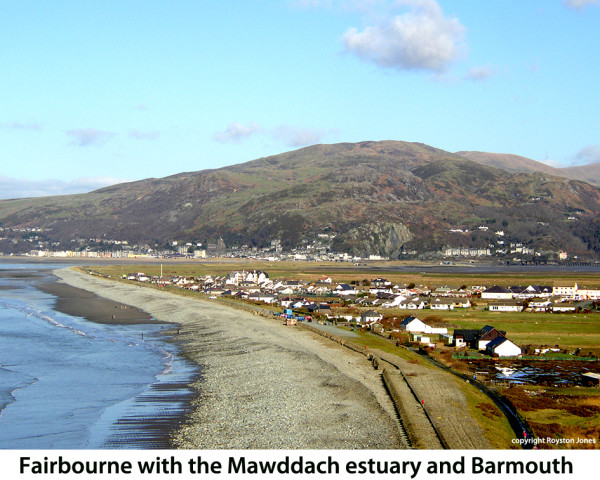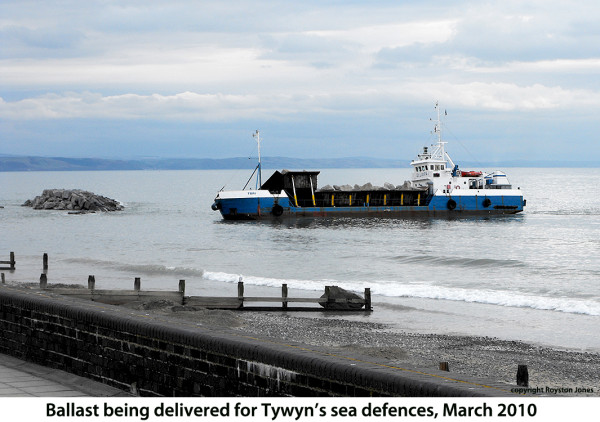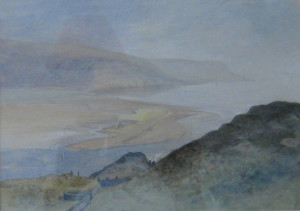Last night’s Week In Week Out on BBC 1 Wales, presented by Tim Rogers, dealt with long term problems posed by erosion or sea encroachment around our coasts, and came with the stark warning that some communities will have to be abandonded, largely because the cost involved in holding back the sea greatly outweighs the value of what is being protected. (Here is a link to the BBC iPlayer version of the programme.)
One of the communities visited was Fairbourne, which is, like most of the others consigned to ‘managed retreat’, a somewhat artificial settlement, built on land reclaimed for the purposes of tourism and retirement. The Fairbourne Wikipedia page says it all: the area was previously known as Morfa Henddol (morfa = fen or sea marsh) and the outcrop on which today stands the Fairbourne Hotel was known as Ynysfaig (ynys = island). Clearly, our ancestors knew this land alongside the Mawddach estuary for what it was. (And will soon be again.)
Also investigated was that sinkhole for Welsh public funding, Rhyl. There we saw a couple who, to judge by the accents, came from the Birmingham conurbation, had been flooded out of their bungalow and were now living in a trailer home. Tim Rogers asked if anything had been mentioned about flooding when they purchased their property. “No, nothing”, was the reply. Which made me think to myself, ‘If I am a shifty developer or estate agent, selling properties I know are vulnerable to flooding – and almost always to people who don’t know the area – am I going to tell these prospective buyers that their dream home might one day be under six feet of water?’ Of course not. This is clearly a case of caveat emptor.
Down here, on our stretch of the coast, Tywyn’s new sea defences worked excellently . . . though there are some in Tywyn that will never admit this as they harbour an irrational hatred for Gwynedd council and all its works, because it’s a) too Welsh and b) run by the wrong party. They would rather gripe and snipe at everything the council does, however beneficial.
Speaking of gripers and snipers, I hear that part of Aberdyfi golf course has joined Neptune’s realm. Sad though this news may be, there can be no justification for spending Welsh public money to preserve what is a private and exclusive asset. Either the club itself pays for new sea defences or else Nature must  be allowed to take its course (‘course’ – geddit!), leaving the Ukipistas to find another rendezvous. Further south, Borth and Aberystwyth also featured in Tim Rogers’ investigation. Now, obviously, Aberystwyth must be defended, but how strong is the case for Borth? It certainly seems that land just north of Borth – curiously enough, another golf course! – is to be surrendered.
be allowed to take its course (‘course’ – geddit!), leaving the Ukipistas to find another rendezvous. Further south, Borth and Aberystwyth also featured in Tim Rogers’ investigation. Now, obviously, Aberystwyth must be defended, but how strong is the case for Borth? It certainly seems that land just north of Borth – curiously enough, another golf course! – is to be surrendered.
Though the bigger picture here, especially when we remember the Towyn floods of 1990 and similar events, is that for a century and more we have allowed, even encouraged, the building of new properties on inadequately defended coastal plains and salt marsh, land on which building should never have been allowed. So why did this happen? The fundamental cause is tourism. Since the coming of the railways over 160 years ago English people have visited coastal Wales for their holidays, and this led to the growth of resorts where little or nothing had existed before the arrival of the iron horse. Many of those tourists wished to settle permanently, perhaps retire to, where they had enjoyed their holidays, so new homes were built for them . . . with the inevitable consequences.
If I owned a home in an area being ‘surrendered’ to the sea, I think I would be asking a few questions. Principally, ‘Why was planning permission granted for my property and others when the risk of flooding must have been known?’ Then, perhaps, ‘Do I have a justifiable claim for negligence or culpability against the body that granted planning permission’? (With this of course extending, particularly in the case of local authorities, to successor bodies.) For no matter what we may think of communities like Rhyl, Towyn and Fairbourne, the people suffering from flooding in such places a re innocent victims and have, to all intents and purposes, been conned into buying the properties under threat.
re innocent victims and have, to all intents and purposes, been conned into buying the properties under threat.
So, in the hope of avoiding any repetition of such miseries, can the puppet show down Cardiff docks, and our local authorities, confirm that no more building will take place in areas that might in future be susceptible to coastal flooding or erosion? (This must also apply to trailer parks and other developments.) More, will these bodies also confirm that any outstanding planning approvals for dwellings in such areas will be revoked? And will the ‘Welsh’ Government also promise us that there will henceforth be a binding national presumption against building any more communities like Towyn and Fairbourne?
Oh, yes, something else that would be very welcome would be a promise from the Planning Inspectorate that in future it will not – in order to follow its over-arching policy of attracting English settlers to Wales – overrule planning bodies that turn down applications for housing in flood-prone areas.
 UPDATE 12.03.14: I am indebted to the person who sent me a copy of this 1868 watercolour claiming to be a view across the Mawddach from Barmouth, showing where Fairbourne would eventually be built. You will note that there is nothing there apart from what looks like a temporary structure, perhaps a fisherman’s hut. Suggesting that the locals had better sense than to try to build anything permanent there. (Click to enlarge.)
UPDATE 12.03.14: I am indebted to the person who sent me a copy of this 1868 watercolour claiming to be a view across the Mawddach from Barmouth, showing where Fairbourne would eventually be built. You will note that there is nothing there apart from what looks like a temporary structure, perhaps a fisherman’s hut. Suggesting that the locals had better sense than to try to build anything permanent there. (Click to enlarge.)

I was looking to buy around the coast, even the most modest properties cost tens of thousands. I found some prospects and then did my own research which completely ruled out everything I had seen. If anyone is dumb enough to spend good money buying property on a flood plane without researching or asking questions, then they deserve what they get when they are flooded!
I know that estate agents on the coast target Easter to September, the tourist season, because that’s when the buyers are about, and that’s when almost any property looks enticing. Consequently, most properties are sold during the summer and autumn when the purchasers have no idea what conditions will be like in bad weather. Estate agents cannot be relied on to tell prospective buyers the bad news, so it’s up to those people to make their own enquiries. Anyone who doesn’t deserves all they get.
Get a life
I have just tried and my message has come back as undelivered – “no ip address”. I tried twice.
Try jacothenorth@gmail.com
I can email it. What is the email address, pls?
Please e-mail to editor@jacothenorth.com
I have a watercolour dating from 1868, which shows the view south across the Mawddach. Apart from what appears to be a fisherman’s cottage towards the end of the spit, there are no houses at all. I would be happy to upload a detail of the painting, if you can tell me how to do it. I am not on social media.
I’d love to see that. You could send it as an e-mail attachment after scanning it. Or even take a photograph. But if it’s under glass beware of reflection or distortion.
Hi the hut! At on the picture of fairbourne was actually a farm house the ruins of which are still their .
Diolch / Thank you.
The BBC seemed to insist on pronouncing Borth as Both (rhyme with moth). They also get Powys wrong regularly.
How can anyone mispronounce Powys?
How can someone mispronounce Davies?
Acres of land underwater.
People take to canoes.
Ak reez of land underwater.
People take to kay nose.
Nothing to do with Mrs Hart, thank god.
On a lighter note, I see the Ukipistas have come second in the Wythenshawe and Sale East by-election.
Swansea here we come.
Here’s a dream scenario: Scotland votes Yes in September and then, in 2015, England elects a Tory-Ukip coalition government.
Hmmm lots of potential there. Wonder what would happen then?
Even the dumbest ‘donkey Labour’ voter might pause to consider the relationship between Wales and England.
Apparently it’s some kind of musical delivery where words are often intertwined with beats from a drumming instrument (such as the leftover Christmas biscuit tin) to create a composition. Sounds very suspicious. Probably something to do with Edwina Hart
And there was me hoping they were some exotic confectionary.
There’s a retailer of confectionery in Wales that doesn’t know how to spell confectionery.
Back to the subject, have you seen the Borth Bog Blaze?
My confections are free. I caught a glimpse of the Borth bog blaze on the BBC website but haven’t paid much attention. Though the thought did cross my mind – ‘Waves to the front and flames to the rear’. Who’d live in Borth, eh?
Rumour has it that you were selling ‘Fishermen’s Friends’ on cold Saturday nights, in Swansea, for a half of Evans & Bevans.
Ah, Evan Evans Bevan, Vale of Death Ales; that takes me back a bit. Though I’m not sure about your reference to ‘Fishermen’s Friends’ (in quotes) especially as the product is correctly called Fisherman’s Friend. (I happen to have a tin in front of me.) Are you trying to suggest something?
Sorry Jac, but being from the “Hood” I prefer “Ukipistas” goes much better with my rap and hip hop.
So be it. What is ‘rap’? And ‘hip hop’?
Ukipistas. I like that word. I suppose I am a “Ukipistas”
Silly boy! The singular form is Ukipista. You haven’t been paying attention, have you!
I cannot imagine Nigel Flange supporters wanting to be called Ukipistas as it sounds foreign and female so, use it often.
Here in the Teifi Valley ‘hinterland’, along the ‘Carmarthen-Ceredigion border stronghold of the Welsh language’, according to the Parish Council on the Bay there seem to be fewer and fewer Welsh/ Welsh speakers. The majority of people appear to be English… and the great majority of them retired or unemployed… who says Cymru has no future?
As things stand there is no future at all, especially in old Dyfed. We’re losing the fight. It’s Round 12 and we’re on the ropes…
Social housing needs to be re-distributed to Welsh-speakers and new towns built for those of us committed to our native tongue and culture. I know that there are plenty of us in post-industrial Blaenau Morgannwg who’d jump at the chance to move back to the literal Land of our Fathers (the English occupying land there don’t like to be reminded that many ‘Valley Commandos’ like myself have family roots in the area).
In the late 1990’s even then it was evident that the majority of people who lived in these coastal areas were English born. The welsh tend to live in the hinterland.
When Towyn flooded in 1990 I remember the perplexed look on the faces of people affected who lived on Ffordd y Gors in Towyn, when told that it translates as bog road and it was in a village which meant sand dunes in an area called Morfa Rhuddlan ( Rhuddlan Marsh) and that the local roads were floated on reed mats and why did they think all the farms were on higher ground and why hardly any Welsh people lived there. Quite handy to speak the lingo at times like these.
Sometimes you don’t even have to translate. I had a mate living in Marsh Road in Rhyl. Does it have to be called Horrendous Flooding Avenue before a prospective buyer takes notice?